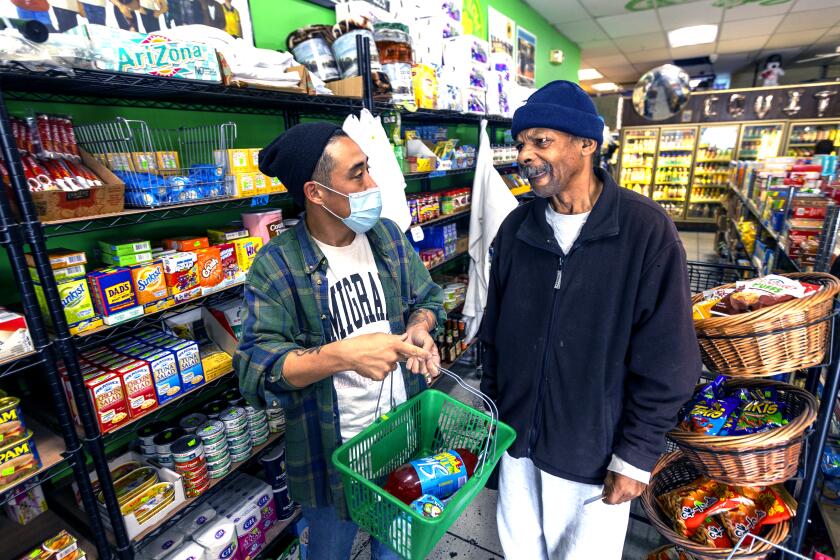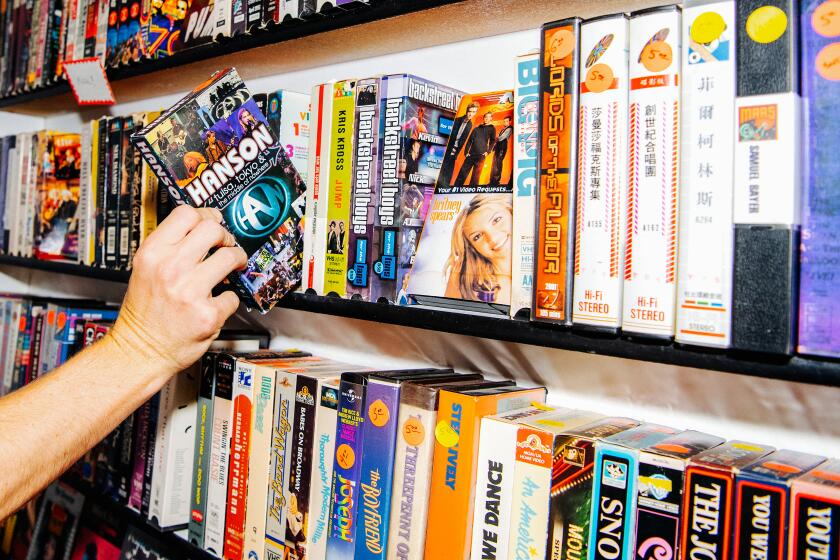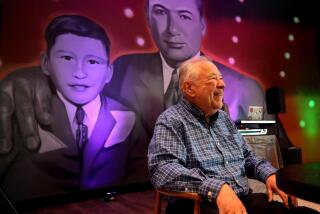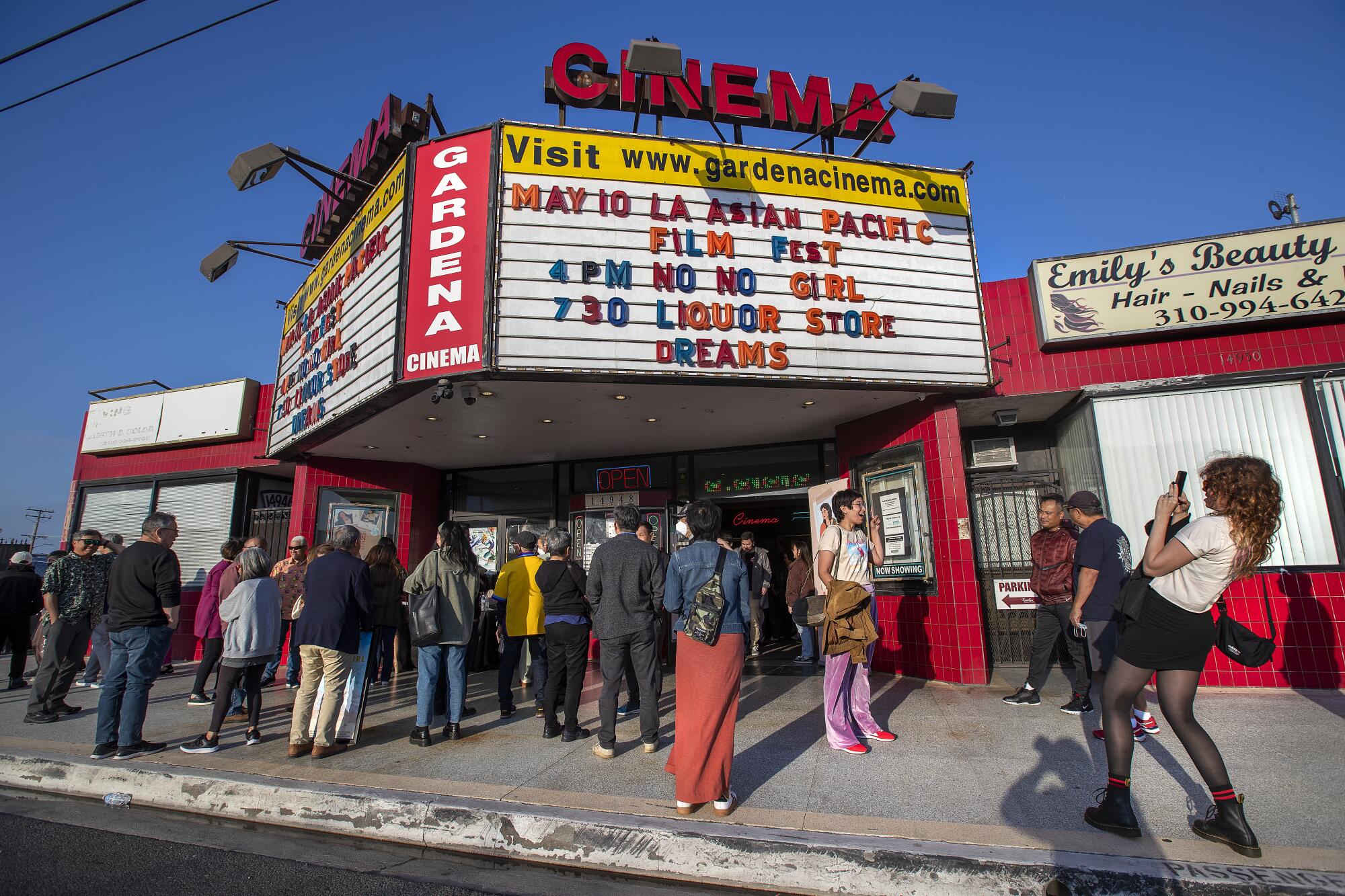
- Share via
Most Wednesday nights, the 800-seat Gardena Cinema has only a handful of people sitting in front of its single screen.
But last week, hundreds of moviegoers almost filled the historic theater twice in one evening, for back-to-back shows as part of the Los Angeles Asian Pacific Film Festival. And that came days after another film organization hosted a special event, drawing about 500 guests to the cavernous space behind an unassuming front on Crenshaw Boulevard.
“I haven’t seen that many people at the theater in probably a few decades,” said Judy Kim, who runs the cinema, one of the last family-owned and operated single-screen theaters in Los Angeles. “I’ve been going nonstop with these special events.”
The revival of the neighborhood cinema, built in 1946 and purchased by Kim’s parents almost 50 years ago, was ignited a few months ago, when Kim realized she couldn’t keep the theater afloat on her own.
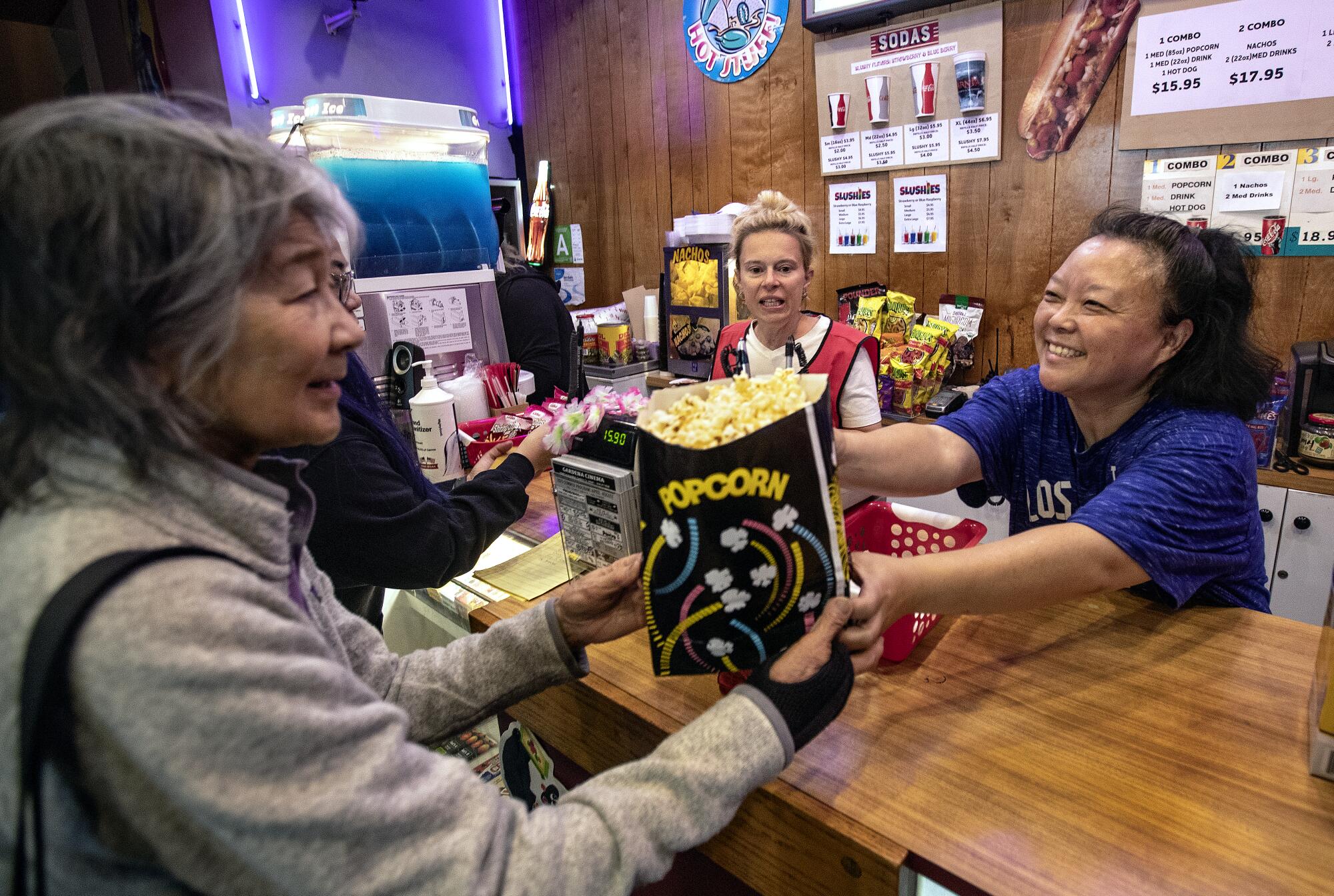
It had been a difficult few years for the family: Her mother — the cinema’s heart since the Kims took over in 1976 — had recently lost her battle with cancer, and the theater remained shuttered for almost three years due to the pandemic.
“The money started running out,” said Kim, 51. “I told my dad, ‘I’m going to need volunteers because I can’t do this by myself.’”
Almost immediately, the community responded to her call.
A groundswell of energy and support breathed new life into the theater as volunteers pitched in to sell tickets, fill concessions, improve the theater’s social media presence and spread the word about the longtime family business.
Among the multitude of exciting and venturesome films screening during the opening week of the Asian Pacific Film and Video Festival is Taiwanese filmmaker Tsai Ming-Liang’s “Vive L’Amour” (UCLA’s Melnitz Theater Saturday at 7:30 p.m.), which is every bit as audacious as his “Rebels of the Neon God,” screened at the festival in 1993.
“The place is rad; there’s no place like this,” said Matt Collette, 48, who joined Kim’s Friends of Gardena Cinema volunteer group, which has continued to expand since October. “You walk in and it looks like time just stopped around 1987. ... There’s no more of these places.”
Francis Cullado, executive director for Visual Communications, said the team behind the Asian Pacific Film Festival was excited to join in the renewed support for the theater.
“We’re just glad there’s a space like this for us to come into,” Cullado said. “For us, we really want to make sure it’s sustained. ... There’s just a character here that you can’t replicate anywhere else.”
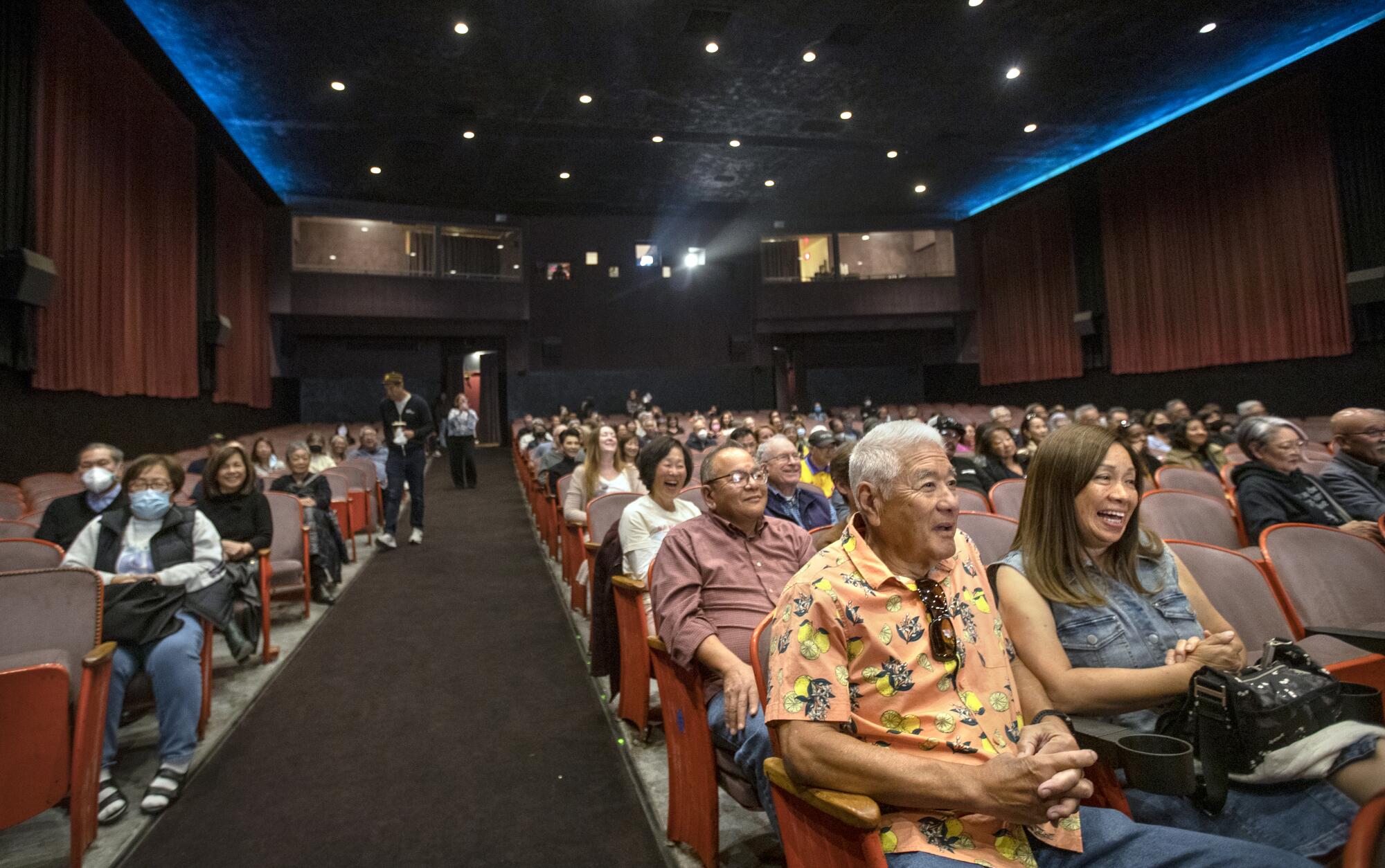
With its red-velvet draping, carpet flooring and no-frills seating, little has changed at the theater since Kim’s parents purchased it a few years after they emigrated from South Korea, besides an upgrade to a digital projector (though Kim still has the old film projector).
Mismatched letters on the theater’s outdoor marquee display the movie schedule for passersby. Inside, colored neon lights hang above the concessions counter, where kernels pop over the sides of a vintage popcorn pot and a yellow notepad collects visitors’ handwritten movie suggestions.
And while the space itself is a draw for any film lover or old-school enthusiast — it’s even been used as a movie set for some recent films and documentaries — most patrons and volunteers say it’s Kim’s warm smile and passion for her community that keeps them coming back.
“There isn’t anything she wouldn’t do for the community — and anyone who meets her, there isn’t anything you wouldn’t do for her,” said Tiffany Nitsche, president of the Los Angeles Historic Theater Foundation’s board of directors.
Danny Park, owner of Skid Row People’s Market, wants the store just south of Little Tokyo to be more than its inventory.
Nitsche said it’s hard to definitively say Gardena Cinema is L.A.’s last family-owned single-screen theater after Quentin Tarantino recently bought the Vista Theatre in Los Feliz, but she said it is “the last family-owned and operated, first-run, single-screen movie theater” — meaning it shows new blockbuster films such as “Black Panther: Wakanda Forever,” which was how Kim reopened last fall after the long pandemic shutdown.
“Judy [Kim] does such a great job in making people feel so welcome,” said So Yun Um, director of “Liquor Store Dreams,” which showed last week at Gardena Cinema through the Asian Pacific Film Festival. “The hard part is people don’t know about it. ... But now that people have seen the inside of it … it really creates a buzz and this sense of community.”
As hundreds flowed into the cinema last week, Kim scrambled around the theater she has managed for almost 30 years — where she grew up alongside her brother and other neighborhood kids — giving directions, restocking snacks, running upstairs to start the films, even pulling out a container of free sanitary pads when a young woman sheepishly asked for help.
The three women behind the counter taking orders for popcorn, soda, nachos and hot dogs were all volunteers, trying to keep up with the mad rush to ease Kim’s workload.
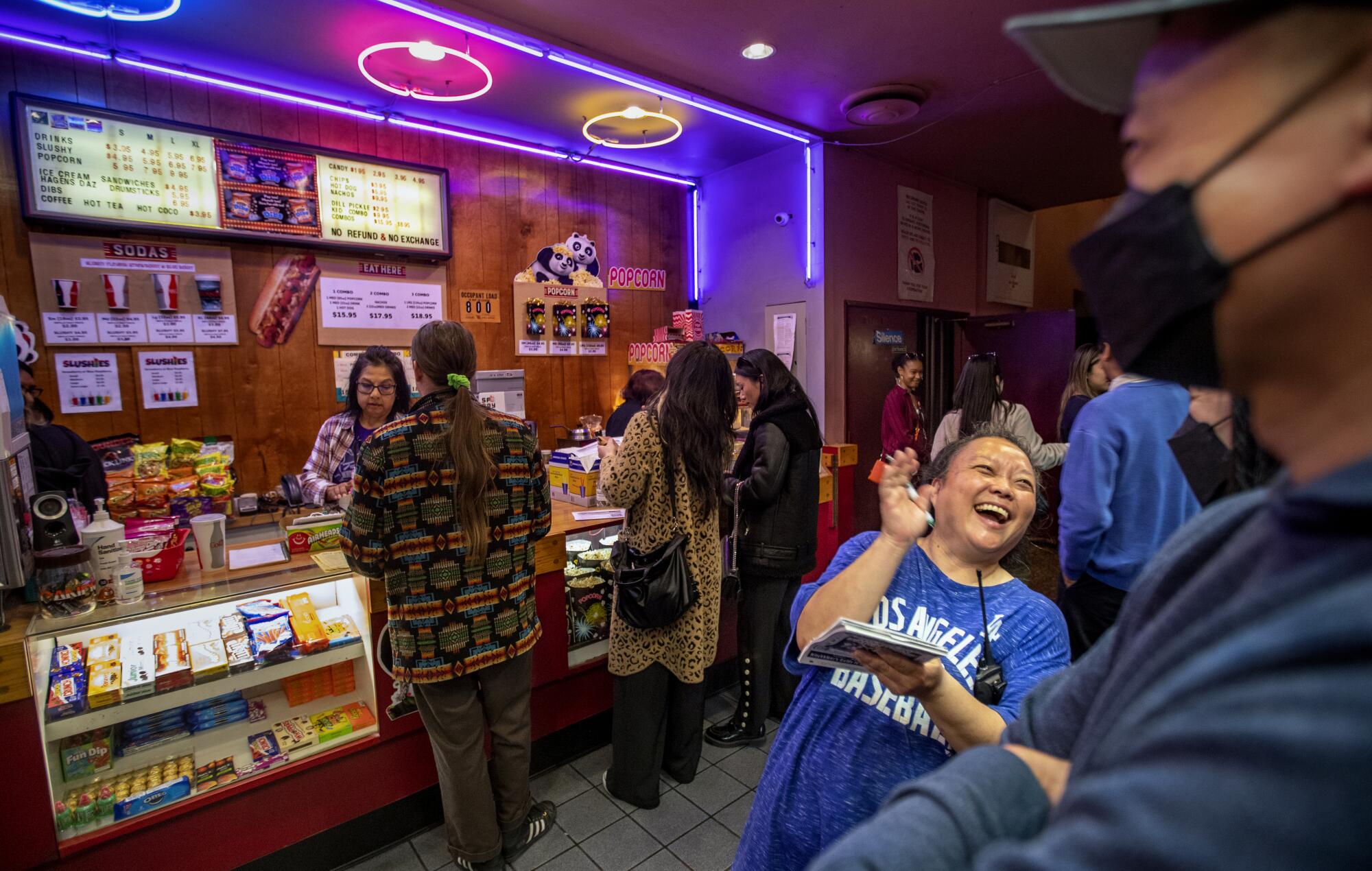
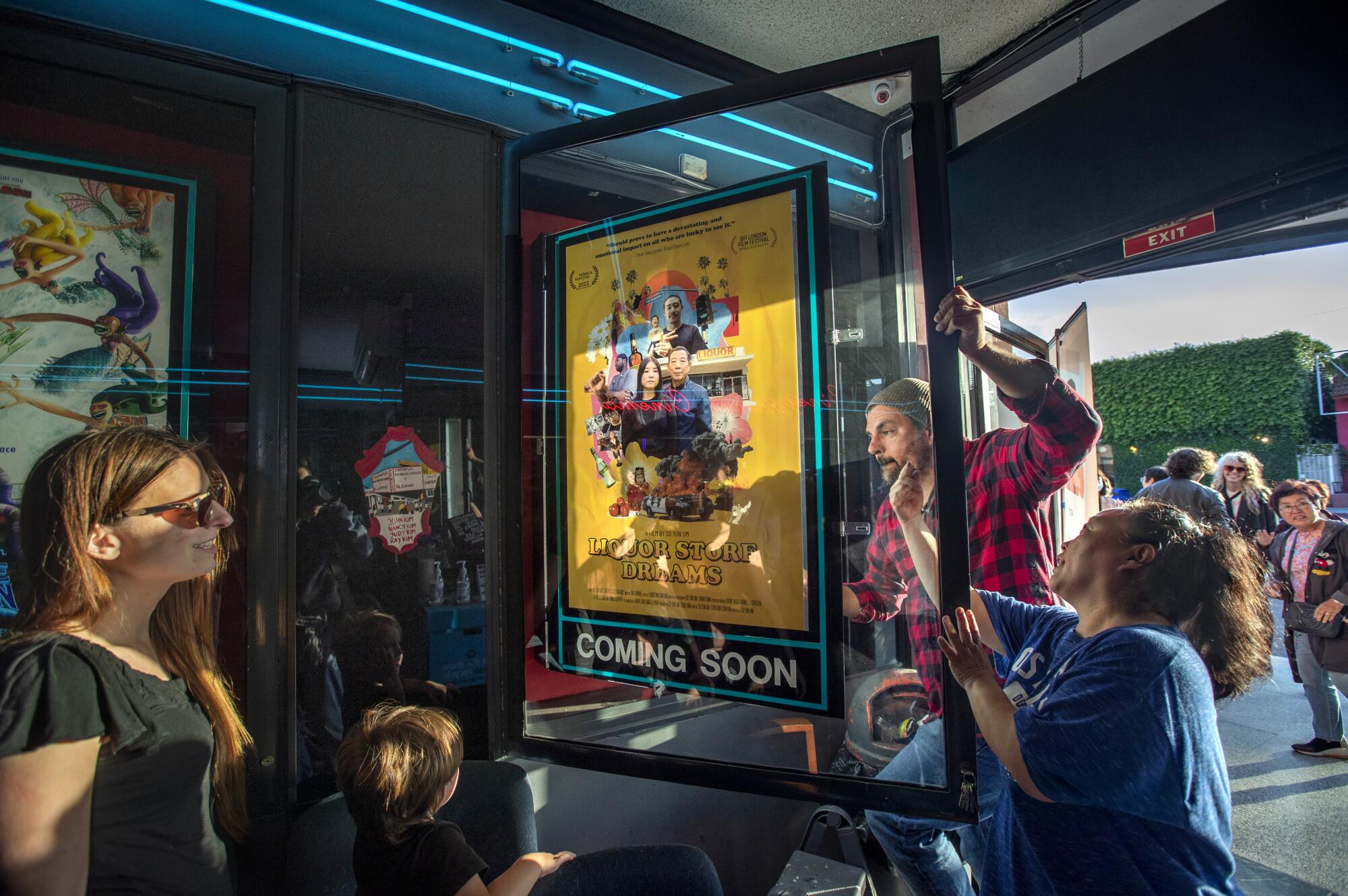
When there was a question about pricing or the butter stopped pumping or a sink started flooding, the volunteer crew would shout for Kim. She literally came running.
“Let me get the mop,” she yelled, before taking over the cleanup duties. “It’s one of the reasons I can’t walk away. ... If I leave, stuff like this happens.”
In the same breath, though, Kim smiled: “I really love all my volunteers.”
On a typical night, it’s just Kim running the theater — a “one-woman show,” she calls it. Her aging father will sometimes work the ticket booth if he’s feeling up to it, but usually it’s just her.
An L.A. couple with a love of obscure video tapes is bringing a dead medium back to life again.
“She’s the booker, the manager … she has to clean the toilets, she’s security, the accountant,” Collette said. “It’s not a sustainable business model.”
Prima Devera, 53, worked the soda machine that Wednesday evening, a job she said she’s happy to take on to help keep the theater — and Kim — going.
“I was really happy to see the community come together, people trying to help save the cinema,” said Devera, who discovered Kim’s theater just before the pandemic and worried how the family would make it through. “I love that it’s family-owned, and being Asian, I loved that it was an Asian family-owned, independent theater.”
Gardena native Suzy Evans remembered visiting the theater as a teen, coming on first dates and with friends. Now, she has joined the growing volunteer network dedicated to the theater, most recently working the popcorn machine alongside Devera.
“It’s like deja vu,” said Evans, 70. “I don’t want to see it close.”
But the future of the cinema is unclear.
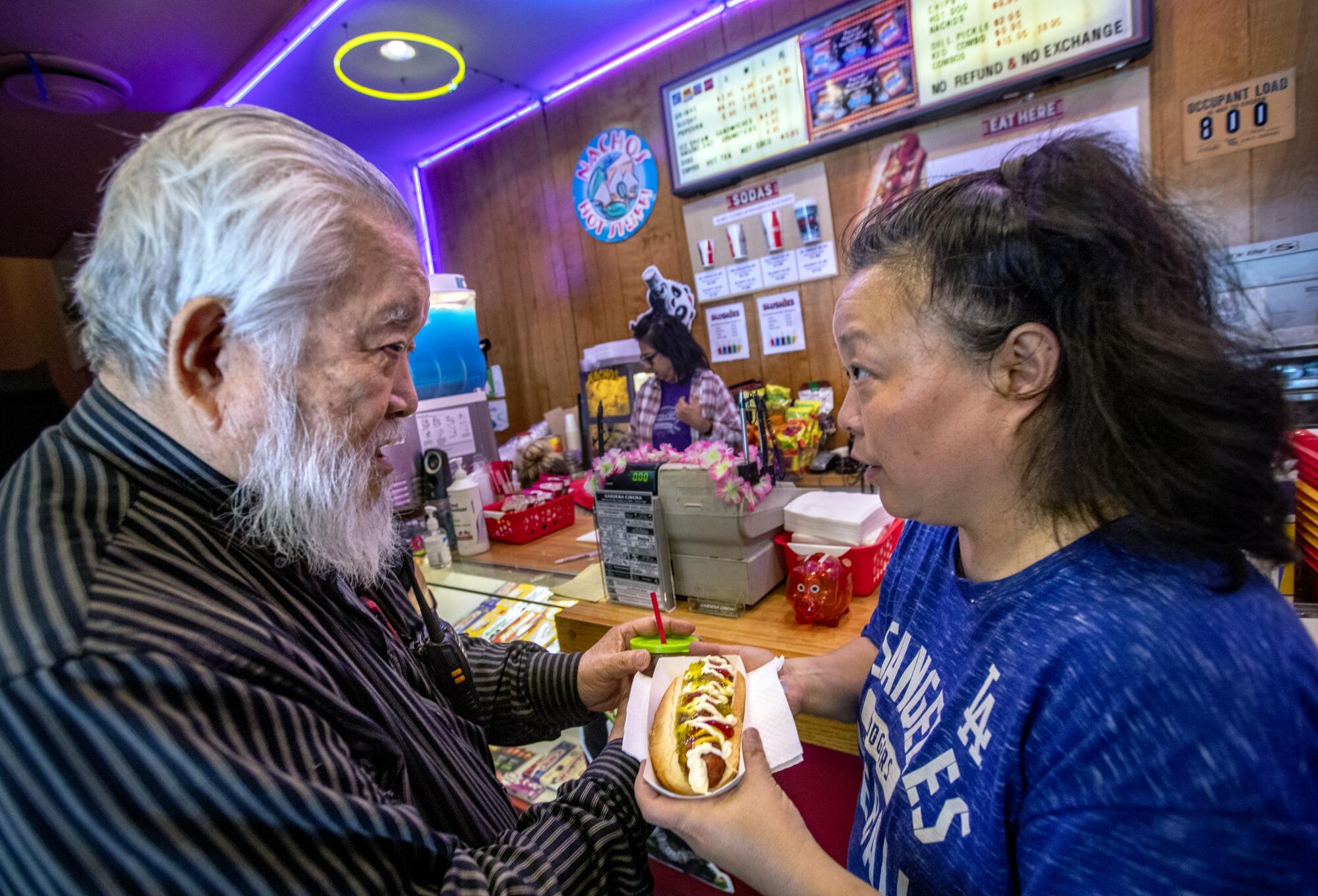
After much deliberation, Kim and her 82-year-old father listed the property for sale in January, but they are committed to waiting for the right price — something she promised her mom on her death bed — and keeping the show going in the meantime.
“There are no more future generations to leave the theater to in our family,” Kim said, explaining that neither she nor her brother has children. Her father wants to enjoy his last years with her, which she said is almost impossible while running the time- and energy-intensive business.
“I don’t really know what the future holds for me because I don’t have a buyer, and I might not have a buyer for like 10 years, right?” Kim said. “So, hey, why don’t I just continue operating it as a nonprofit organization for 10 years and give people the benefit of being able to donate to an organization that they want to keep, and keep the doors open?”
This spring, Kim registered with the state as a nonprofit and is working on finalizing her paperwork with the federal government — a step that she hopes will provide more financial support from donations or membership drives.
Celebrating 30 years this weekend, the Sistas Are Doin’ It for Themselves Short Film Showcase has been a launchpad for Gina Prince-Bythewood, Kasi Lemmons and more.
“The theater is so huge, and there’s so many things I need to do to maintain it,” Kim said. “The only way I’m going to get a new roof and a new parking lot and make the place pretty and freshen it up [is] if I get nonprofit status.”
But even that can be a difficult path for small, historic theaters. The nonprofit American Cinemateque recently bowed out after decades of owning and operating Hollywood’s Egyptian Theatre, selling to Netflix in 2020.
“If they happen to sell it, hopefully whoever purchases it will at least keep it a theater,” Devera said, echoing many of the Gardena Cinema volunteers. “I would really, really be sad to see this venue go completely.”
They hope that new interest in the theater, especially among young people, will help the cinema hold on to its legacy in the South Bay.
And with a resurgence in film, vinyl records and other old-school charms among Gen Z and millennials, Kim said it worked out that her parents were reluctant to pay for upgrades, like the new theater chairs she tried for years to get her mom to buy.
“It’s been so long now, it’s like cool,” Kim laughed. “Now that we kept them … they’re vintage.”
More to Read
Sign up for Essential California
The most important California stories and recommendations in your inbox every morning.
You may occasionally receive promotional content from the Los Angeles Times.
